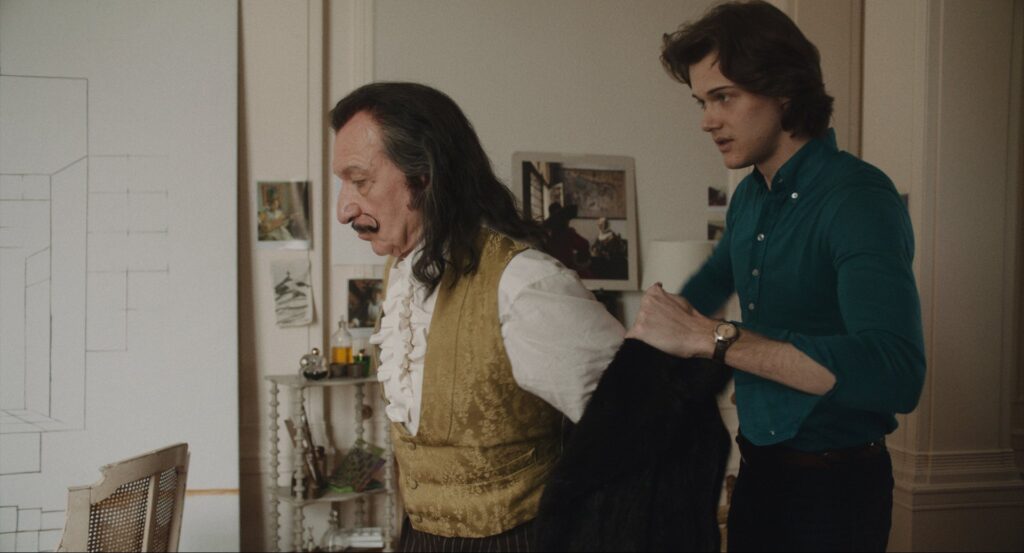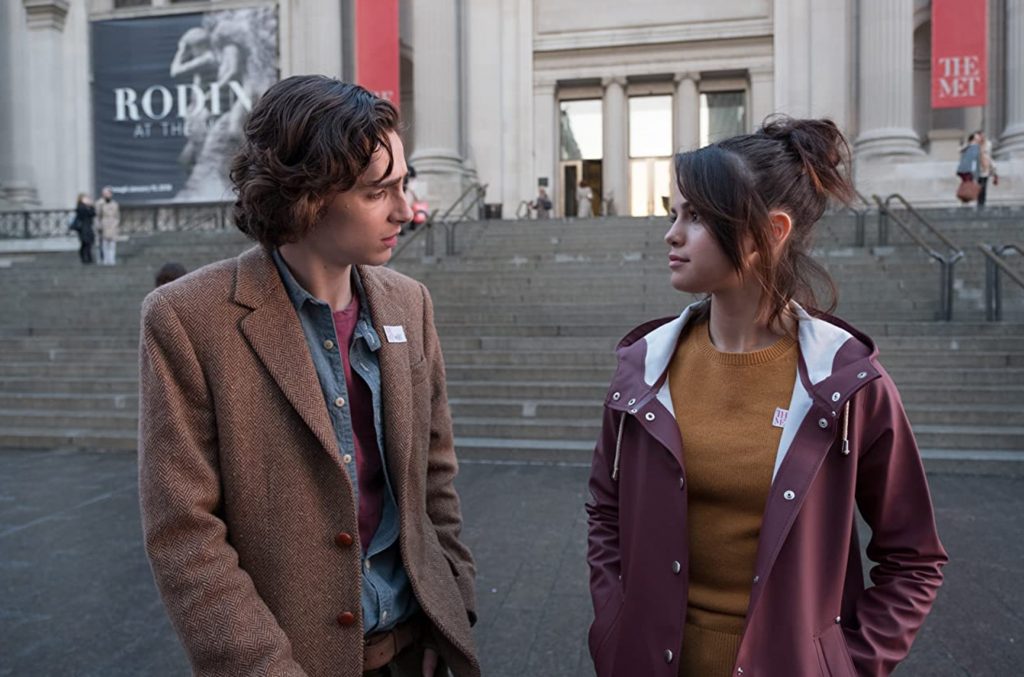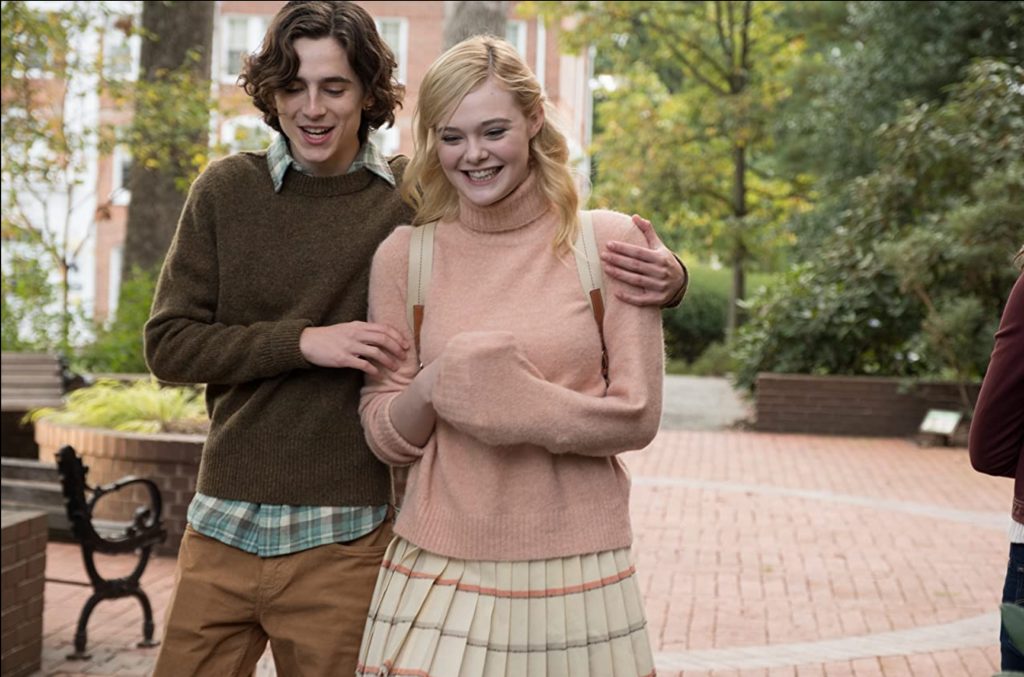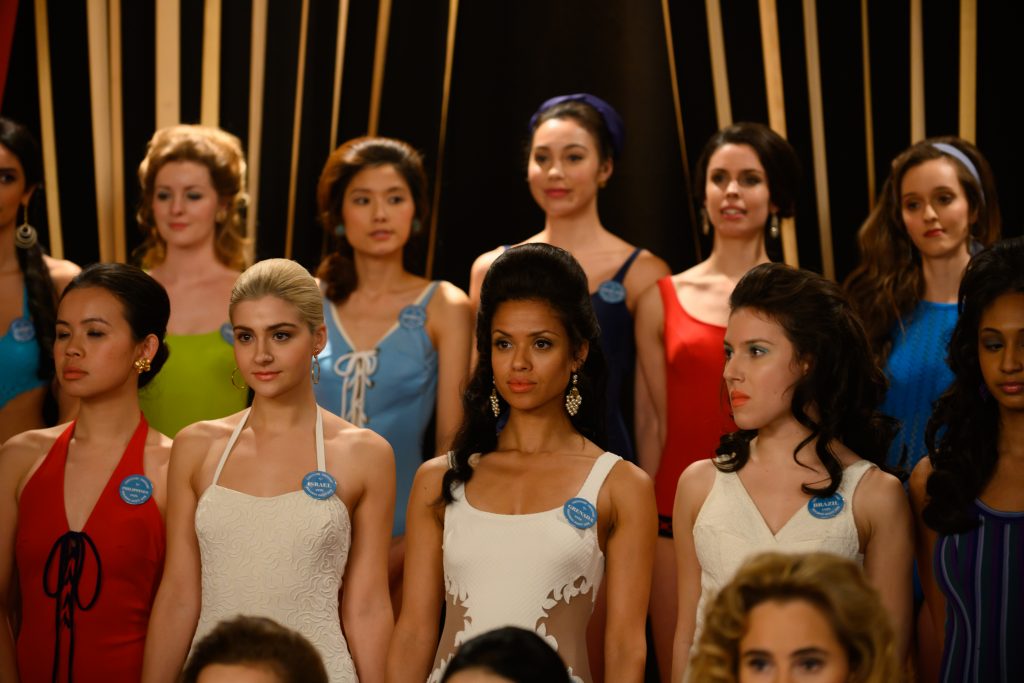July 29, 2023
by Carla Hay

Directed by Mary Harron
Culture Representation: Taking place in the United States and Europe, from 1974 to 1989 (with a few flashbacks to the 1920s), the dramatic film “Dalíland” features a predominantly white cast of characters (with a few African Americans) representing the working-class, middle-class and wealthy.
Culture Clash: An eager young apprentice/assistant finds his life altered when he works for world-famous and eccentric painter Salvador Dalí.
Culture Audience: “Dalíland” will appeal mainly to people who are fans of Ben Kingsley, filmmaker Mary Harron and artist Salvador Dalí, but viewers might be unimpressed by this pedestrian and often-boring way that this story is told.

You would think that a dramatic movie about the real-life flamboyant and highly eccentric artist Salvador Dalí would be a reflection of that image, by having a vibrant personality, unusual creativity and an unpredictable edge. However, “Dalíland” is a completely watered-down and muted disappointment that tells the story from the perspective of a bland apprentice/assistant of Dalí, who spends most of the movie being an awestruck lackey. Ben Kingsley’s performance as Salvador Dalí comes close to being a satirical impersonation. The rest of this drama is underwhelming and makes fascinating real-life people either hollow caricatures or very dull. Too much of “Dalíland” looks fake.
Directed by Mary Harron and written by John Walsh, “Dalíland” had its world premiere at the 2022 Toronto International Film Festival. It’s not a completely terrible film, because there are some fleeting moments that are entertaining, and the movie’s acting performances are mostly serviceable. But there’s not enough to hold this movie together when so much of it is focused on a fictional neophyte character who isn’t nearly as interesting as the people around him in the art world where he’s desperate to get acceptance.
“Dalíland” opens with a scene that takes place in 1985. Dalí (played by Kingsley) is shown as a guest on the American TV game show “What’s My Line?,” where contestants try to guess the identity of a mystery celebrity who is hidden from view but who answers questions about the celebrity’s identity. Dalí gives “yes” answers to all the questions he’s asked, which confuses the contestants until one of them correctly guesses his identity, probably because of Dalí’s heavily-accented voice. (Dalí, who was born and raised in Spain, died in 1989, at the age of 84.)
The person who is watching this TV show is James Linton (played by Christopher Briney), who is also watching when the TV news shows a report that Dalí has been injured in a fire at his home. James is a fictional character who’s supposed to represent one of the many young men whom Dalí employed as his personal assistants. James becomes Dalí’s assistant at a time when Dalí was starting to become a has-been in the art world, and he was diluting his own brand name by selling prints of his work.
After the TV-watching scene in 1985, “Dalíland” then flashes back to New York City in 1974, when James (an art school dropout in his early 20s) was an eager art gallery assistant. At the time, James is working for Dufresne Gallery. And he is sent on a fateful errand to the St. Regis Hotel, where Salvador and his wife Gala Dalí (played by Barbara Sukowa) have been living for the past 20 years. James’ elitist and demanding boss at Dufresne Gallery is named Christoffe (played by Alexander Beyer), who has given James the task of delivering a package to Gala.
On the elevator to the Dalí couple’s hotel suite, James meets Dalí’s secretary Captain Peter Moore (played by Rupert Graves), also known as Captain Moore, who offers to take the package up to the suite, but James politely declines and says that he’ll do it himself. Captain Moore is curious about James, who is a newcomer on the scene. James has been working at Deufresne Gallery for only a few months. James is up front in telling Captain Moore that he’s an art school dropout who’s still learning about the art industry: “I realized I’m not an artist. I just love art,” James says to Captain Moore.
During this package delivery, James meets Salvador and Gala. And this wide-eyed newcomer gets to see firsthand what their life is like when he is immediately invited to parties hosted by the couple. One of the main reasons why he’s invited is because James is young and very good-looking. Gala, who has an eye for this type of man, makes a sexual advance on James soon after she meets him, but he tactfully deflects her attempts to seduce him.
These party scenes have very good production design, but the cast members in these scenes don’t look entirely convincing. They look like they’re playing dress-up as 1970s hipster characters. Sukowa makes an effort to portray Gala as a three-dimensional person, but Gala is so annoying, viewers will quickly grow tired of her diva antics. Birney, like his character James, often looks uneasy among the more experienced cast members. Don’t expect to learn much about James’ life outside of the Salvador Dalí entourage bubble, because the movie gives very little depth to James.
From the outside looking in, the Dalí lifestyle seems to be an endless parade of artsy, glamorous people, while Salvador gets some painting done in between. Rock star Alice Cooper (played by Mark McKenna) hangs out on a regular basis. Another artist who is part of the Dalí inner circle is transgender model Amanda Lear (played by transgender model Andreja Pejić), who was an important muse for Salvador in real life.
But don’t expect Alice or Amanda to be compelling characters in “Dalíand.” Alice only has a handful of lines in the movie, while Amanda is portrayed as lacking any genuine spark and being just another pretty model who poses for Dalí. It’s a big contrast to the real Cooper and Lear, both known to have very charismatic personalities in real life.
At one of these parties, James meets a hanger-on named Ginesta (played by Suki Waterhouse), who introduces James to drugs and sexual experimentation. It’s mostly a superficial romance. Ginesta often makes James feel like a naïve lover, and she acts superior to him, as if he should be grateful that she’s “teaching” him how to be “cool.” It never looks like a relationship with any substance, which is why it gets monotonous to watch very quickly. Unfortunately, the James/Ginesta relationship takes up more screen time in “Dalíland” than it should.
James’ partying with the Dalís makes Christoffe question James’ loyalties, so Christoffe fires James from Dufresne Gallery. It doesn’t take long for James to get hired as Dalí’s personal assistant. And that’s when James’ life becomes even more chaotic, as he has to kowtow to Salvador’s bizarre demands and has to navigate the volatile nature of Salvador and Gala’s unconventional marriage.
James finds out that Salvador and Gala stopped having sex with each other years ago and have an “open marriage” where they know about most of each other’s affairs and often get jealous. An example of Salvador’s strangeness is in a scene where Salvador orders James to get these items for an upcoming party: “a few hundred live ants, some dead grasshoppers, four dwarfs and a suit of Spanish armor.” James willingly obliges.
“Dalíland” goes off on an unnecessary tangent of showing flashbacks to Salvador and Gala in their 20s. Ezra Miller has the role of young Salvador. Avital Lvova has the role of young Gala. There’s nothing wrong with the acting in these 1920s flashback scenes, but the way these scenes are dropped into the movie just seem downright awkward.
Speaking of awkward, much of the dialogue is a tad ridiculous, even in the pretentious world of fine art. For example, there’s a scene where an elderly female gallery customer (played by Eithne Browne) looks at a Salvador Dalí painting hanging on a wall and is contemplating whether to buy it or not. James, who is standing next to her, comments to her about the painting: “I can’t figure how it’s pulling me in, but somehow it’s taking me inside of its dreams. It’s just paint on paper, but it’s powerful. It’s kind of magic.”
The woman replies, “I don’t think I want to live with someone else’s weird dream on my wall.” James then says to her: “But that weirdness is what makes it original. It got to you. That’s why I’ll never get tired of it. I’ll never forget it. It’s Dalí.” The woman ends up buying $15,000 worth of Dalí prints.
The movie depicts how Salvador, desperate for money, began cheapening his brand by selling prints. Salvador is also portrayed as becoming deeply cynical about art. Salvador says to James at one point: “Modern painting is left behind … Now, it’s about making things that are like posters.”
Salvador adds, “Once you start talking about squirting the paint from the tube onto the wall, the whole spiritualization process of art is lost. It becomes an absurdity. The paint, it doesn’t count until it disappears and becomes an illusion of reality. Abstract painting will one day be seen as a total disaster.”
If you want to watch a movie that’s filled with this type of this type of cringeworthy dialogue, then maybe you’ll enjoy “Dalíland.” But if you want to gain insight into why Salvador Dalí was such a revered artist, “Dalíland” is not that movie. What makes it worse is the “Dalíland” moves at a sluggish pace and had the potential to be so much better, considering that the real Dalí had such a fascinating life and the film has several talented cast members. “Dalíland” is a rambling, often-pompous movie that—unlike the real Salvador Dalí—does not leave a strong impression and does not have any real impact on artistic creativity.
Magnolia Pictures released “Dalíland” in select U.S. cinemas, on digital and VOD on June 9, 2023.






